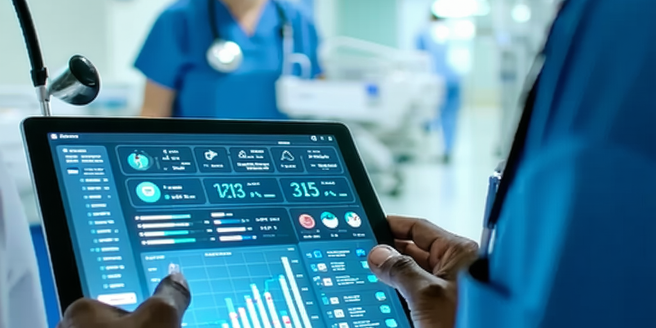Cybersecurity Threats In Digital Health Systems

Understanding the Landscape of Digital Health Systems
Digital health systems are revolutionizing patient care through advanced technologies like Electronic Health Records (EHRs), telemedicine, and mobile health applications. These systems enable seamless data exchange and provide healthcare providers with critical insights into patient health. However, this interconnected landscape also introduces significant security challenges. Protecting patient data from unauthorized access is crucial as data breaches can have severe implications. Healthcare organizations must implement robust cybersecurity measures to safeguard this information against threats. Importantly, understanding how these systems operate and their vulnerabilities is fundamental to enhancing security. As digital health systems continue to evolve, keeping pace with advancements while ensuring data protection will be a significant focus for healthcare providers globally, underscoring the need for ongoing education and investment in security infrastructure.
Common Cybersecurity Threats in Healthcare
The healthcare industry is a prime target for cyber threats due to the sensitive nature of the data it handles. Common cybersecurity threats include ransomware attacks, where attackers encrypt critical data and demand a ransom for its release. Phishing schemes also pose a significant risk by tricking employees into providing access credentials. Additionally, outdated systems and software vulnerabilities make healthcare systems susceptible to attacks. Protecting against these threats requires a multifaceted approach, including employee training, regular system updates, and strong access controls. Healthcare organizations must be vigilant in their defense strategies, as cyber attackers continuously develop new methods to exploit weaknesses. Ensuring the confidentiality, integrity, and availability of patient data is critical, making cybersecurity a top priority in healthcare operations.
The Impact of Data Breaches on Patient Privacy
Data breaches in healthcare can have devastating consequences for patient privacy. When unauthorized individuals gain access to sensitive medical records, patients are at risk of identity theft and fraudulent activities. This breach of trust can also lead to physical harm if medical information is altered or misused. The emotional and psychological impact on affected individuals is profound, as patients may feel violated or vulnerable. Breaches also undermine public confidence in healthcare providers, making it essential for organizations to prioritize data protection. Implementing stringent security measures and protocols is crucial to minimize the risk of breaches. As the frequency and sophistication of attacks grow, healthcare organizations must remain vigilant in protecting patient privacy to maintain trust and uphold the integrity of the healthcare system.
Emerging Technologies and Their Security Challenges
With rapid advancements in healthcare technology, such as the Internet of Things (IoT), artificial intelligence (AI), and blockchain, new security challenges emerge. These technologies offer significant benefits, including improved patient monitoring and data analysis. However, they also introduce complexities in securing networked devices and ensuring data integrity. IoT devices, for instance, can be vulnerable to hacking if not properly secured, potentially compromising patient care. AI systems, while capable of providing advanced diagnostics, require rigorous testing to prevent biases and ensure accuracy. Blockchain technology, designed for secure data sharing, still faces issues related to scalability and regulatory compliance. It is crucial for healthcare providers to stay informed about these challenges and adapt their security strategies accordingly, ensuring that emerging technologies are both beneficial and secure.
Strategies for Strengthening Cyber Defenses
Strengthening cyber defenses in healthcare requires a comprehensive approach that combines technology, policy, and education. Regular audits and risk assessments are vital to identify and address vulnerabilities in healthcare systems. Implementing multilayered security measures, such as firewalls, intrusion detection systems, and encryption, can fortify defenses. Employee training plays a crucial role in preventing human errors that often lead to security breaches. Encouraging a culture of security awareness helps staff recognize and respond to potential threats. Developing incident response plans ensures that healthcare organizations can swiftly mitigate the impact of attacks. Collaboration between healthcare providers, cybersecurity experts, and regulators is essential to share insights and best practices. By adopting these strategies, healthcare organizations can reduce risks and protect against the ever-evolving landscape of cyber threats.
The Role of Regulations and Compliance in Cybersecurity
Regulations and compliance play a pivotal role in maintaining cybersecurity within the healthcare sector. Frameworks like the Health Insurance Portability and Accountability Act (HIPAA) establish standards for protecting sensitive patient information. Compliance with these regulations ensures that healthcare providers implement necessary safeguards to secure data. Regular audits and assessments are mandated to verify adherence to standards, and non-compliance can result in substantial penalties. These regulations also promote transparency, building patient trust by ensuring that their data is handled with care. However, compliance should not be seen as a one-time exercise; ongoing monitoring and adaptation to emerging threats are necessary. By integrating regulatory compliance into their cybersecurity strategies, healthcare organizations can enhance their resilience against threats and protect their reputations.